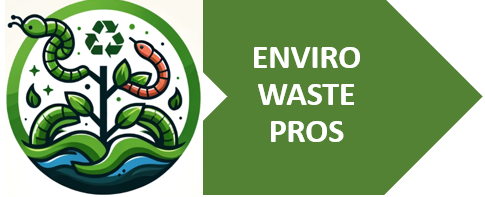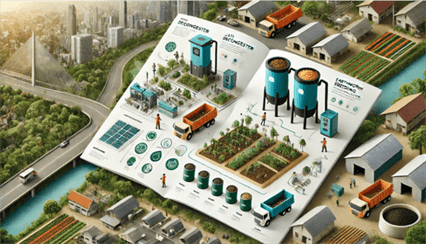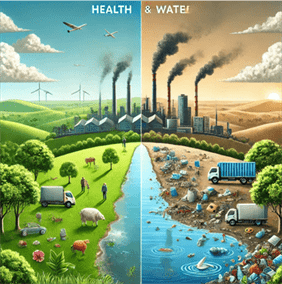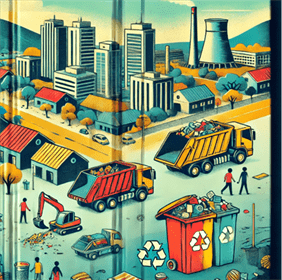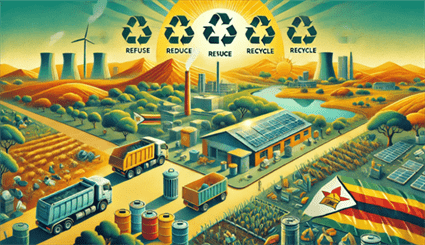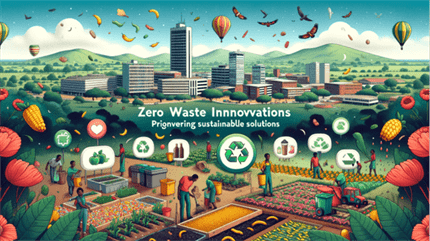Policies and Sustainability Initiatives in Waste Management
1. Introduction
Sustainability in waste management is crucial for preserving natural resources, protecting the environment, and ensuring the well-being of future generations. Effective policies and sustainability initiatives are essential to manage waste responsibly and minimize its impact on the environment. This article explores the importance of sustainability in waste management, current policies and legislation, key sustainability initiatives, challenges and risks, successful case studies, and future goals.
2. Current Policies and Legislation
Government Policies
Government policies play a pivotal role in shaping waste management practices. These policies set the framework for waste collection, treatment, and disposal, ensuring that waste management practices align with environmental and public health goals. Key government policies include:
- Waste Management Acts: Legislation that governs waste management practices, including guidelines for waste segregation, collection, and disposal.
- Environmental Protection Regulations: Laws that regulate emissions and effluents from waste treatment facilities to protect air and water quality.
- Incentives for Recycling: Policies that provide financial incentives for individuals and businesses to recycle and reduce waste.
Role of the United Nations Environment Programme

The United Nations Environment Programme (UNEP) supports global efforts to promote sustainable waste management practices. UNEP provides guidelines, technical assistance, and funding for waste management projects worldwide. Key initiatives include:
- Global Waste Management Outlook: A comprehensive report that provides insights into global waste management trends and best practices.
- International Environmental Agreements: UNEP facilitates agreements such as the Basel Convention, which controls the transboundary movement of hazardous wastes and their disposal.
3. Sustainability Initiatives
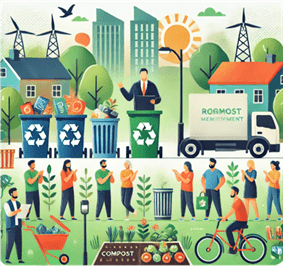
Projects and Initiatives Supporting Sustainability
Numerous projects and initiatives support sustainability in waste management. These initiatives focus on reducing waste generation, promoting recycling and reuse, and implementing environmentally friendly waste treatment technologies. Examples include:
- Zero Waste Cities: Initiatives that aim to eliminate waste through comprehensive recycling and composting programs.
- Extended Producer Responsibility (EPR): Policies that make producers responsible for the entire lifecycle of their products, including take-back, recycling, and final disposal.
Life-Cycle Assessment in Waste Management
Life-cycle assessment (LCA) is a method used to evaluate the environmental impacts of waste management practices from cradle to grave. LCA helps in identifying the most sustainable waste management options by considering factors such as:
- Resource Consumption: Assessing the use of natural resources in waste management processes.
- Emissions and Pollutants: Evaluating the emissions and pollutants generated during waste treatment and disposal.
- Energy Use: Analyzing the energy required for waste collection, transportation, and processing.
4. Challenges and Risks
Governance Issues
Effective governance is essential for the successful implementation of waste management policies and initiatives. Challenges in governance include:
- Regulatory Enforcement: Ensuring compliance with waste management regulations.
- Coordination Among Stakeholders: Facilitating collaboration between government agencies, private sector, and communities.
Environmental and Economic Risks
Waste management practices can pose environmental and economic risks, including:
- Environmental Risks: Pollution from waste treatment facilities, illegal dumping, and inadequate landfill management.
- Economic Risks: High costs of waste treatment technologies and infrastructure development.
5. Case Studies
Successful Policy Implementations
Several countries have successfully implemented policies that promote sustainable waste management. Examples include:
- Sweden: Sweden’s waste management system emphasizes recycling and energy recovery, with less than 1% of waste ending up in landfills. Policies such as EPR and landfill bans have contributed to this success.
- Japan: Japan’s waste management policies focus on reducing waste generation, promoting recycling, and ensuring proper waste treatment. The country’s “3Rs” (Reduce, Reuse, Recycle) approach is widely recognized.
6. Future Goals
Long-Term Sustainability Goals
Long-term sustainability goals in waste management include achieving zero waste, reducing greenhouse gas emissions, and conserving natural resources. Key goals are:
- Zero Waste: Implementing comprehensive waste reduction and recycling programs to eliminate waste generation.
- Carbon Neutrality: Reducing emissions from waste management practices to achieve carbon neutrality.
- Resource Conservation: Promoting sustainable consumption and production patterns to conserve natural resources.
Strategies for Achieving These Goals
Strategies to achieve long-term sustainability goals include:
- Innovation in Waste Treatment Technologies: Developing and adopting advanced technologies for waste treatment and recycling.
- Public Engagement and Education: Raising awareness about sustainable waste management practices and encouraging community participation.
- Policy Integration: Integrating waste management policies with broader environmental and sustainability goals.
7. Conclusion
Sustainable waste management is essential for protecting the environment and ensuring the well-being of future generations. Effective policies, supported by initiatives from organizations like UNEP, play a crucial role in promoting sustainability. Despite challenges, successful case studies demonstrate that sustainable waste management is achievable. Continued efforts in policy implementation, technological innovation, and public engagement are necessary to achieve long-term sustainability goals and create a cleaner, healthier future.
